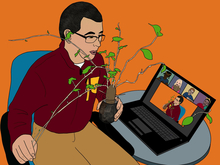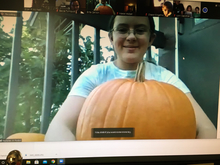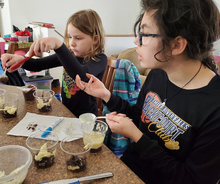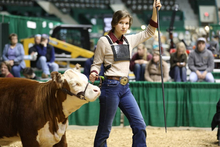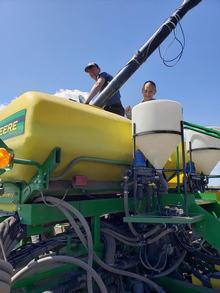University of Minnesota Extension brings plant science to youth wherever they live, while keeping it hands-on.
Brian McNeill showed off his growing sweet potato vine to the young viewers through his computer’s camera. “Can you guess how many inches it is?” asked the University of Minnesota Extension youth development educator as more participants joined the 4-H Ag and Hort Afternoon Adventures session.
“31 inches,” one youth responded in the chat.
“A yard,” said another. After more hurried guesses, Brian gave a thumbs up to the closest guesser.
In 2020, 1,377 Minnesota youth of all ages participated in an agronomy or horticulture project through 4-H. By following a model of “plant, learn, grow,” 4-H teaches youth how to care for plants and soil, as well as the science behind how climate, moisture, pests, light and other factors affect crop cycles. Youth learn how these sciences address global issues like food insecurity.
Hands-on learning and friendships
McNeill, along with Extension educators Becca Turnquist and Nick Podoll, launched the 4-H Ag and Hort Afternoon Adventures in the fall of 2020. Youth in third through sixth grade are introduced to a new topic via Zoom, and follow up with hands-on learning from their homes or schools. Many will also participate in the traditional project learning.
Jillian Babler, a 4-H mom from Sherburne County, homeschools three children. “I’m always looking for new ways for them to learn and interact with other youth,” she says. “My kids and I have thoroughly enjoyed this series because it’s something that we can all do together.”
Each month has a theme and challenges to support it. After each session, youth are sent a packet of seeds in the mail with information on seed starting. By spring, participants had an array of vegetables to plant in their own garden or wherever they choose. “I’ve always loved gardening,” says 10-year-old Brita Carlson of St. Louis County. “I love learning about vegetables and the different types of soil and sediment found in Minnesota.”
Brenden Biss, a nine-year-old from Grant County, enjoyed connecting with youth his age. “I like the activities and meeting kids from across the state,” he says.
The Minnesota Corn Growers provided funds to make afternoons more adventurous for these young people. “We are committed to supporting and promoting agriculture in Minnesota,” says Jean Knakmuhs, a Minnesota Corn Growers board member. “4-H is a tremendous organization that does great work.”
4-H Agriculture Ambassadors
Extension 4-H educators are always creating ways for older youth to build leadership skills. Through the new 4-H Agriculture Ambassador program, teens assist with learning experiences, facilitate small groups and share their perspectives on agriculture. Maren Hoben, 18, is the youth project leader for Becker County’s beef and swine committee. “Becoming an ag ambassador seemed like the next step for me,” she says. “I always go for opportunities that come my way.”
Luke Gordon, 17, has served as a youth officer on the Nobles County Federation Board for three years. “I wanted to be an ambassador to continue the legacy in my family,” he says. “My dad and brothers have all been in this role and I wanted to do the same.”
Hoben and Gorden, along with the others, are preparing Ag Mythbusters presentations to share in 2021 with 4-H clubs, city councils and other groups. Hoben, for example, will dismantle notions people have about how farmers care for livestock and show that farmers provide humane treatment.


